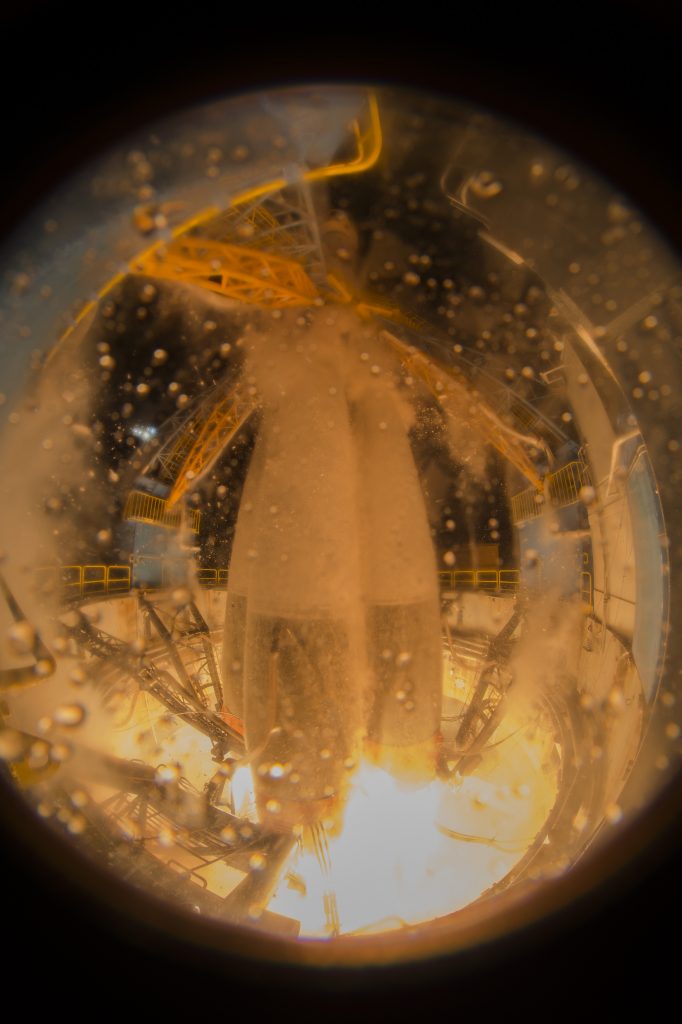As I reflected on the successful launch of Hispasat 36W-1 on the new SmallGEO geostationary platform on a Russian Soyuz rocket from Kourou, French Guiana, and the current global political backdrop, it got me thinking about cooperation, competition and the impact they have.

The Soyuz carrying ESA’s new SmallGEO telecom platform, captured at the moment of lift-off. Credit: ESA, S. Corvaja, 2017. [Original image]
At a news conference in 1962, John F. Kennedy said, “We believe that when men reach beyond this planet, they should leave their national differences behind them.” Interestingly enough, he made this statement in the middle of the Cold War when the space race was in full swing. That space race was mainly focused on the Moon and the prestige of being the first nation to succeed in sending an astronaut/cosmonaut to the surface of our closest celestial neighbour. Now, more than fifty years later, the “landscape” of space is very different: cooperation in many fields forms the basis of successful space activities for all humanity but, at the same time, competition as a driver for innovation is still a powerful and helpful presence.
The crucial point is how we strike the right balance between competition and cooperation. Within ESA, striking this balance is not some hidden, mysterious process with visible results. Instead, it is a daily challenge that involves considering industrial and scientific development activities in the Member States while, at the same time, respecting geo return rules. This is done in a transparent way through the subscription of programmes, decisions taken in favour of certain projects and the tendering process. Although one might point to some difficulties and problems in this process, these basic principles are part of the beauty of ESA, exploiting the great diversity of its Member States and their industrial and scientific capabilities to perform joint activities.
This daily experience of handling differing national interests puts ESA in a special position when looking to international cooperation. Cooperation on a global scale draws on the competences of the various partners, created and stimulated through competition. In addition, cooperation requires trust on an institutional as well as on an individual level. ESA’s acceptance as a partner both east and west is a reflection of its experience, the quality of its activities and great personal commitment shown over many decades, and the Agency is determined to prove, day in, day out, that it is fully deserving of that status.
Trust is based on hardware, and on space missions but also on how we respond when complicated situations arise. Full transparency may cause some trouble in the short term, but it is the only way to be accepted by partners, stakeholders and shareholders alike.
The fact that space is far from routine is an important message that deserves to be conveyed at all times. The harsh environment of outer space and the difficulty of performing maintenance there can lead to systems failures. There is no magic formula to avoid this occurring with 100% probability. However, there are measures such as redundancy that reduce the effect of partial failures. Just how far you go depends on the importance of any given aspect and is linked to the way competition is organised. As Alan Shepard said, “It’s a very sobering feeling to be up in space and realize that one’s safety factor was determined by the lowest bidder on a government contract.”
In today’s world, global cooperation can be seen as a means of securing space as an important infrastructure underpinning modern life. No less importantly, however, global cooperation in space also serves as an instrument to bridge earthly crises for the sake of our planet and I will continue to work tirelessly to that end.

Discussion: 2 comments
This is an interesting op-ed. I am deeply convinced that any responsible foreign policy on a national level of states within EU should contain a space component. First, people in EU should hear that European nations are stick together for greater goals to support the ties in EU and, second, putting such topics in front of foreign policy would open much more cooperative imperative in foreign policy and thus between nations. We need to have more space ambassadors to push the agenda forward on national levels. This applies on other than EU countries as well, of course.
Speaking of competition and cooperation; a lot of competing US commercial corporations (Blue Origin, SpaceX, Lockheed, Google X-price, Bigalow, etc) are pushing NASA to return to the moon.
Given ESA’s longstanding vision and preparation and partnerships for Moonville, are you ready to take advantage of this?
For instance Blue Origins recent proposal to NASA to provide a moon lander Blue Moon that supposedly could fly on Atlas; it may then fly on Ariane5 too, and provide the missing lander/return capacity. (Untill IXV-derivative landers become available)
With all the established and new European space centers opening up, I am sure there are enough proposals for (smaller) science missions that could be send to the moon on it; perhaps even start an imitation of NASA’s successful Commercial Cargo partner program, where ESA sponsors/leases Moon machine services/facilities/rovers/energy in milestones.(That can be cargo on existing rockets. )